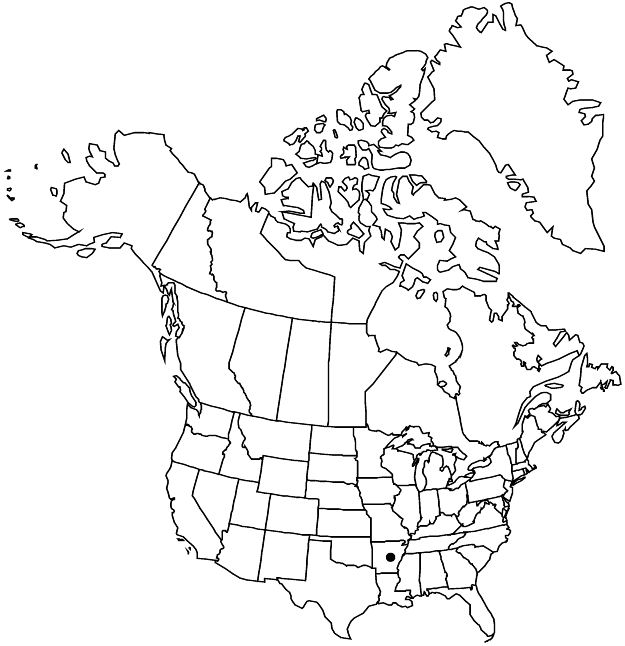familyRosaceae
subfamilyRosaceae subfam. Amygdaloideae
genusCrataegus
sectionCrataegus sect. Coccineae
speciesCrataegus ouachitensis
Difference between revisions of "Crataegus ouachitensis var. minor"
J. Arnold Arbor. 7: 124. 1926.
Conservation concernEndemic
FNA>Volume Importer |
FNA>Volume Importer |
||
| Line 23: | Line 23: | ||
}}<!-- | }}<!-- | ||
| − | --><span class="statement" id="st-undefined" data-properties=""><b>Leaves:</b> petioles ca. equal to length of blade; blade 2–3.5 cm, longer than wide to as long as wide, lobes somewhat more deeply incised, margins sharply serrate (more so than var. ouachitensis), abaxial surface more densely hairy on veins, adaxial more densely scabrous young. <b>Inflorescences</b>: branches sparsely villous. <b>Pedicels</b> ± tomentose young. <b>Flowers</b>: sepal margins subentire.</span><!-- | + | --><span class="statement" id="st-undefined" data-properties=""><b>Leaves:</b> petioles ca. equal to length of blade; blade 2–3.5 cm, longer than wide to as long as wide, lobes somewhat more deeply incised, margins sharply serrate (more so than <i></i>var.<i> ouachitensis</i>), abaxial surface more densely hairy on veins, adaxial more densely scabrous young. <b>Inflorescences</b>: branches sparsely villous. <b>Pedicels</b> ± tomentose young. <b>Flowers</b>: sepal margins subentire.</span><!-- |
-->{{Treatment/Body | -->{{Treatment/Body | ||
| Line 31: | Line 31: | ||
|distribution=Ark. | |distribution=Ark. | ||
|discussion=<p>Of conservation concern.</p><!-- | |discussion=<p>Of conservation concern.</p><!-- | ||
| − | --><p>Variety minor is very different from the typical variety. The entire plant is more or less glabrescent by maturity. It is quite possible that var. minor is a hybrid of C. marshallii, as originally suggested on the type material, in which case it is not a form of C. ouachitensis.</p> | + | --><p>Variety minor is very different from the typical variety. The entire plant is more or less glabrescent by maturity. It is quite possible that <i></i>var.<i> minor</i> is a hybrid of <i>C. marshallii</i>, as originally suggested on the type material, in which case it is not a form of <i>C. ouachitensis</i>.</p> |
|tables= | |tables= | ||
|references= | |references= | ||
| Line 55: | Line 55: | ||
|publication year=1926 | |publication year=1926 | ||
|special status=Conservation concern;Endemic | |special status=Conservation concern;Endemic | ||
| − | |source xml=https://jpend@bitbucket.org/aafc-mbb/fna-data-curation.git/src/ | + | |source xml=https://jpend@bitbucket.org/aafc-mbb/fna-data-curation.git/src/8f726806613d60c220dc4493de13607dd3150896/coarse_grained_fna_xml/V9/V9_1011.xml |
|subfamily=Rosaceae subfam. Amygdaloideae | |subfamily=Rosaceae subfam. Amygdaloideae | ||
|tribe=Rosaceae tribe Gillenieae | |tribe=Rosaceae tribe Gillenieae | ||
Revision as of 18:13, 18 September 2019
Leaves: petioles ca. equal to length of blade; blade 2–3.5 cm, longer than wide to as long as wide, lobes somewhat more deeply incised, margins sharply serrate (more so than var. ouachitensis), abaxial surface more densely hairy on veins, adaxial more densely scabrous young. Inflorescences: branches sparsely villous. Pedicels ± tomentose young. Flowers: sepal margins subentire.
Phenology: Flowering Apr; fruiting Sep–Oct.
Habitat: Thickets along streams
Elevation: 100–300 m
Discussion
Of conservation concern.
Variety minor is very different from the typical variety. The entire plant is more or less glabrescent by maturity. It is quite possible that var. minor is a hybrid of C. marshallii, as originally suggested on the type material, in which case it is not a form of C. ouachitensis.
Selected References
None.
Lower Taxa
None.
